Comenius projekt
A Trip in Europe With A Suitcase Full of Games, Songs, and Stories
Utazás Európában egy bőrönddel, tele játékokkal, dalokkal, mesékkel
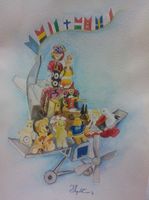
A Székács József Evangélikus Óvoda, Általános Iskola és Gimnázium ismét nagyszabású projektbe kezdett. Egy újabb sikeres pályázat kapcsán az intézmény 20,000 eurót nyert a Tempus Közalapítványtól, ezúttal egy angol nyelvű Comenius nemzetközi együttműködés megvalósításához.
Ezúttal hét európai ország ismerkedett meg közelebbről egymással. Svéd, finn, belga, olasz, lengyel és török diákok tapasztalják meg a kultúrák és országok közötti hasonlóságokat, különbségeket.
A projekt címe: A Trip in Europe With A Suitcase Full of Games, Songs, and Stories,
projektazonosítója: 2012/CIMP-307.
A megvalósítás időszaka: 2012. augusztus 1. és 2014. július 31.
A személyes utazások mellett a diákok az internet és a modern technológia nyújtotta lehetőségeket kihasználva, a távolságokat percek alatt áthidalva dolgoztak együtt. A projekt legkézzelfoghatóbb eleme egy bőrönd, melyet minden országnak fel kellett töltenie hazai sajátságokkal, játékokkal, képregényekkel, valamint egy, az országra jellemző plüssállattal, aki két évig utazott Európa-szerte.
Az első találkozásra Svédországban, Stockholm egyik peremvároskájában került sor, ahol az iskolát Fehér Borbála igazgatónő, Schmittinger Anikó intézményi kapcsolattartó, valamint A kockásfülű nyúl képviselte, aki Belgium felé vette útját. Magyarországra a svéd bőrönd érkezett, benne utazott Moses, egy rénszarvas, aki meg fog ismerkedni a Székács iskola diákjaival, Orosháza jellegzetességeivel, útinaplójában dokumentálva élményeit.
Ezután egy valamivel nagyobb különítmény utazott Lengyelországba. Tavaly márciusban a repülőgép Olaszország felé repítette iskolánk képviselőit, amit a tanév elején egy finn utazás követett. Az adventi időszakban Belgium volt az úti cél, most pedig az utolsó állomás, a mi iskolánk következett.
Magyarország
Május 23-án pénteken érkeztek meg vendégeink Magyarországra, összesen 43-an. 23 pedagógust és 20 diákot láttunk vendégül, először Budapest egy kicsiny szeletkéjét megmutatva, majd egy fárasztó éjszakai utazás és rövid alvás után a Gyulai várat „ostromoltuk" mintegy hatvan fős csapatunkkal. A történelmi utazás után a gasztronómiába vetettük bele magunkat. A vendég diákokat iskolánk tanulói fogadták be, a családok finomabbnál finomabb falatokkal várták a fáradt kirándulókat vasárnap este az iskola dísztermében.
Hétfőn és kedden az iskolával, óvodával ismerkedhettek meg vendégeink, a frissítést pedig a Dotto-kisvonatos városnézést követően Gyopáros biztosította számukra. Kedden a vendégeké volt a főszerep, összesen 10 tanórát tartottak meg nálunk. Bemutatták lakóhelyüket, táncot tanítottak, különféle tevékenységekkel mozgatták meg a tanulócsoportokat.
Kedd reggel a vendég diákok ellátogattak a múzeumba is, ahol a kenyérsütés izgalmas, ugyanakkor fárasztó műveleteit élhették át. A kenyértésztát megdagasztották, amit kelesztés után a múzeum dolgozói takaros cipókká formálták és a kemencében kisütötték. Délután a diákok megkapták a cipókat, melyeket megkóstolva ízlelhették a méltán híres „orosházi kenyeret".
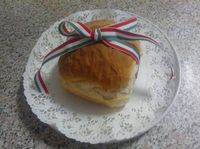
Kedden délután elérkezett a látogatás csúcspontja, a majdnem két éve tartó projekt zárása. Az iskola tanulói és tanárai színvonalas műsorral, hatalmas lelkesedéssel készültek az alkalomra. A partnerintézmények képviselői szintén szerepeltek a műsorban. Országról országra haladva a magyar „utazók" felvezetése után következett az élmények felelevenítése. Szép emlékek, tanulságos élmények, tartalmas beszélgetések, találkozások és búcsúzások, barátságok sorakoztak egymás után. Az emlékezés után a boldogság pillanatai következtek, a tanulók és a tanárok őszinte örömmel mutatták be az adott ország egy-egy jellemző táncát, megfűszerezve az angol versmondó verseny helyezettjeinek előadásával.
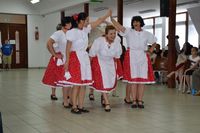 |
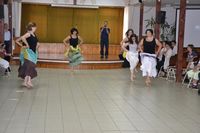 |
|
|
|
Az est fénypontját a főtéren láthatták az arra járók, minden vendég diák és pedagógus, a fogadó diákok és a szereplők mindannyian elküldték kívánságaikat, örömüket, üzenetüket egy papírcetlin, melyet héliumos léggömb emelt a magasba. Felemelő látvány volt a sok-sok színes léggömb útja a felhők közé. Ezután az iskola udvarán hangulatos vacsorát fogyasztottak el a vendégek, majd pityeregve búcsút vettek egymástól.
 |
 |
A hét országban tett látogatások során számtalan résztvevő került kapcsolatba egymással, jó barátként váltunk el egymástól, bízva a mielőbbi viszontlátásban.
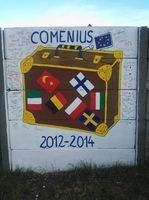
MESÉK
A projekt során egyik feladatunk volt, hogy illusztrációt készítsünk egy-egy saját mesénkhez, valamint a kapott képek alapján a diákok is megfogalmazták saját meséiket. Ezután minden ország megosztotta a saját meséjének eredeti verzióját.
Svéd mese
A favágó  Élt egyszer egy favágó. Ez a favágó egy szép napon kiment az erdőbe. Nézte a gyönyörű erdőt és arra gondolt, hogyan mentse meg a fákat.
Élt egyszer egy favágó. Ez a favágó egy szép napon kiment az erdőbe. Nézte a gyönyörű erdőt és arra gondolt, hogyan mentse meg a fákat.
Hazament és gondolkodott. Amint így tanakodott, megjelent az ördög.
- Látom, bánt valami. - mondta az ördög.
- Úgyse tudsz te az én bajomon segíteni!
- Mert mi a gond?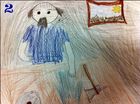 - Nem szeretném kivágni a fákat az erdőben, mert védelmezi az állatokat és táplálékot is nyújt. Az embereknek nyugalmat és friss levegőt.
- Nem szeretném kivágni a fákat az erdőben, mert védelmezi az állatokat és táplálékot is nyújt. Az embereknek nyugalmat és friss levegőt.
- Na, ezen könnyen segítek!
- Hogyan tudnál segíteni?
- Majd meglátod! Csak egyet kérek.
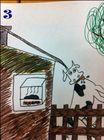
Add nekem a legkisebb fiadat!
A favágó elgondolkodott. tudta, hogy a fia ügyes, bátor legény, bízott benne.
- Rendben! - mondta a favágó.
Elmesélte a fiának a történetet.
- Egyet se búsuljon, Édesapám! Majd ellátom az ördög baját!
Másnap reggel a fiú a kéményhez kötött egy tehenet azért, hogyodacsalogassa a kéményhez az ördögöt. A legény közben begyújtott a kemencébe és a pappal megszenteltette a tüzet. Az ördög egyszer csak betoppant az ajtón. - Na, látom, hívtál a tehénnel és a tűzzel!
- Na, látom, hívtál a tehénnel és a tűzzel!
- Hívtalak, bizony, ördög!
- Én oda biz' a nem megyek! Nem leszek a szolgád!!!
 Felkapta a fiú a baltát és olyan erővel vágta hozzá, hogy az ördög, zsupsz! beleesett a szentelt tűzbe. A szentelt tűz örökre eltűntette az ördögöt. A favágó és a fia azóta boldogan élnek és védelmezik az erdőt és az állatokat.
Felkapta a fiú a baltát és olyan erővel vágta hozzá, hogy az ördög, zsupsz! beleesett a szentelt tűzbe. A szentelt tűz örökre eltűntette az ördögöt. A favágó és a fia azóta boldogan élnek és védelmezik az erdőt és az állatokat.There once was an old man and an old woman. The old man was working in the forest, cutting wood and collecting branches, while the woman stayed at home and spun, cooked and took care of the house. So it was, one day after the other. But the old man complained that he to go toiling all day to support the family, while the old woman was sitting at home and just cooked porridge and ate and had a good day. The old woman stated that there was enough to do at home as well, and that the old man would have a shortage of food and clothing, if she did not look after the house. But the old man did not want to hear about it. He got the whole burden alone, he thought. One day, when they had quarreled longer than usual, the woman said:
- Now that's it! Tomorrow we make a change of jobs. I go to the forest and chop wood and gather branches, and you stay at home and take care of my chores. The old man had nothing against it.
- Easily should I care for the house, he said, but how you will get out into the woods, I would like to see. Early in the morning the woman said:
- Now you need to bake bread, churn butter, let the cow out to feed and cook the kale for dinner.
Yes, it was pure trivia for the old man, and thus they parted. The old woman took the axe and went out into the woods, while the old man started a fire in the oven and made the dough. When he found that the dough was ready, he began to bake. But what would become of bread, you might wonder, for he had forgotten the yeast and put the loaves in the oven without sweeping away the ashes.The old man thought he had handled the baking well. The thought of fresh breadgave him an appetite.
- Fresh bread is good, he thought, but if you get the pork too, it tastes even better. Thought and done! He went out into the shed for the only piece of pork they owned.
But the pork was salty, and therefore he wanted to have a little drink. He put the piece of meat on the basement stairs and stepped down into the basement. Just as he got the tap to the barrel in hand, a dog came and took the pork piece. The old man didn't want to lose it and therefore he set off after the dog. As he ran, he noticed that he had the tap in his hand. Now he gave up the pork, to at least save the drink. But it was too late. The barrel was empty and all the good drink had run out. It was sad, but he consoled himself with the thought that the old woman certainly did not look after the forest better. And if he could do without pork and drinking, he had, after all, the good fresh bread left. He who has bread suffers no distress, says the proverb.
The consolation was not prolonged. When he came into the house, he saw that all the bread was black and burnt. He didn't get to taste one bit of the entire baking. Surely that was annoying.- This goes badly, he complained. I wish I had let the woman stay at home! Is it this bad for me, how will it then be for her in the forest? She could have cut both arms and legs off.
But there was no time to think about it. The sun was high in the sky and he was supposed to cook kale for dinner. For kale, one must have a little green, and when he could not find any other green
than the old woman's sweater, he hacked it to pieces and put them in the pot. He could not cook kale without water, he realized, but the the well was so far away. And he should of course churn the butter too! How on Earth would he keep up with all this?
- If I take the core on the back and shake it firmly while going to the well and back, it will be enough butter when I get back, he thought.
So he did. But at the rate he forgot to put the lid on, and when he leaned down to pull up the bucket of water, the cream ran all down over his shoulders and down the well. Distressed, he turned back with the soup water. He could not be both inside and outside at the same time. How would he handle this delicate matter? The cottage roof shone green in the sunlight. Up there there was lush green grass. He tied a long rope around the neck of the cow, dragged her onto the roof and threw down the other end of the rope through the chimney. A little happier, he stepped into the house and tied the rope that hung down from the chimney, around the waist, so the cow could not walk away from him. Then he began to blow on the fire under the pot. But as he blew, the cow fell down from the ceiling and pulled him up the chimney. At the same moment the old woman came home with a large bunch of branches on her back. When she saw the cow hanging by the ottage wall, she hurried forward as fast as she could, and cut the rope. Then she Went into the cottage. There was the old man on the floor, smoked, burned and half smothered.
- God help me! She said. How have you handled yourself at home?
The poor old man could not utter a word. He just whined and whined. But how he had behaved,
the old woman soon noticed. The pork was gone, the drink spilled, charred bread. The cream was
in the well and the sweater was chopped into the pot. The cow was hung and the old man himself
badly shocked and burned.
What happened then, is not difficult to understand. The old woman had to manage the household again, and the old man went to the forest. Never again he was heard complaining about his lot.
Egyszer volt, hol nem volt, az Üveghegyen is túl, ahol a kurta farkú malac túr, volt egy törpeország. Ezt az országot egy aranyhegy vette körül. Ha illetéktelen próbált bejutni, akkor olyan erős fényt árasztott, ami megvakította az idegent.
Ebben az országban a Csigacsáp nevű faluban élt egy törpe. Úgy hívták, hogy: Törpegerusz. Ez a Törpegerusz egy faházikóban éldegélte éveit, piros színű fekete bojtos sapkát, piros szemüveget, piros pulcsit és piros nadrágot, barna csigacsápos papucsot hordott. Állán fekete szakáll díszelgett. a falu törpéi csak egyszerűen Piros Manónak hívták.
Éppen Kukocikanóra napra virradt. Törpegerusz fölkelt, megmosakodott, megivott egy forró csigacsáp kakaót. Amikor feltöltötte magát energiával, kilépett az ajtón. Igencsak meglepődött, amikor egy Giga Kukacot pillantott meg. Amikor végre felocsúdott, jajgatva szaladt a törpék bölcséhez: Oktipuszhoz. Oktipusz háza volt az egyetlen a faluban, aminek cserép teteje volt. Belépett az ajtón. Megpillantotta a bölcset, aki éppen az íróasztalánál ült. Törpegerusz félénken megszólalt:
- Kedves Oktipusz! Azért jöttem, mert a házam előtt egy óriási barna hétalvó kukac alszik.
A bölcs halkan megfordult és ezt felelte:
- Azt hiszem, tudom a megoldást! Kövess!
Oktipusz kilépett a manóajtón. Odakint rengeteg manó nyüzsgött. Elszaladt mellettük és egy kis alagút felé vette az irányt. Az alagút végén egy kerek vasajtó állt. Lenyomta a kilincset. Az ajtó nagy nyikorgással kinyílt. Erős fény világított a szemükbe. egy napfényes tisztásra értek. Hegyek ormán, völgyek alján mentek keresztül, míg végül eljutottak az égig érő fához. A fa törzsén apró ajtó díszelgett. Beléptek, és egy hosszú, kacskaringós csigalépcsőn haladtak fölfelé. Végül eljutottak egy kis odúhoz. Ebben az odúban a Mindentudó Bagoly élt. Eközben a kukac szépen, lassan csúszott fától fáig és mindegyikről lerágta a leveleket. Törpegerusz és Oktipusz már a Mindentudó Bagoly odújában ültek. Törpegerusz elmesélte, hogy mi történt. A bagoly fontolkodván hümmögött, aztán felállt és odament a nagyszekrényhez. Amikor kinyitotta az ajtaját, a két vendégnek tátva maradt a szája. Csillogó kristályok, varázsszerekkel teli üvegcsék és ezer színben pompázó szemüvegek csodálatos látványa tárult eléjük. A bagoly egy pillanatig habozott, végül egy csillogó barna szerrel teli üvegcsét vett elő. Odaadta Törpegerusznak és ezt mondta:
- Ettől a szertől a kukac elindul az otthonához, ahol eddig is élt.
Törpegerusz megköszönte a sok segítséget és már indult is volna, de Oktipusz utána szólt:
- Várj! Van egy sokkal gyorsabb út! Utaztál-e már Szárnyascsiga háton?
Törpegerusz némán megrázta a fejét. Oktipusz füttyentett egyet, és már ott is termett a két Szárnyascsiga.
- A csigaragéta készen áll! - kiáltották a csigák.
Oktipusz és Törpegerusz felszálltak és már repültek is. Mindketten leszálltak Törpegerusz háza előtt. Törpegerusz megköszönte Oktipusznak a segítséget és már futott is a kukac után. Egy óvatlan pillanatban beleöntötte a szájába a szert. A kukac megrázta a fejét és szépen, lassan elindult az otthona felé. Törpegerusz utána kiáltott:
- Jó, utat, Kukac!
A karácsony
Egyszer volt, hol nem volt, volt egyszer egy mikulás. A mikulás egyszer, ahogy aludt, meglátta az ablakából, hogy valami fénylik. Kimegy megnézni és egy szép aranyszínű nagy kukacot lát. Az egyik manó dolgozott, hallotta, hogy csörög a telefon. Bement, felvette. A télapó volt az. Mondta a télapó, hogy most nem tud bejönni dolgozni, mert egy aranyszínű kis kukackán kell segíteni.
- De jelentsd be a többi manónak, hogy álljanak neki dolgozni.
- Rendben, télapó - mondta a manó.
A mikulás követte, hogy hova megy a kukacka. De, - gondolta-, nem tudja hol van a házikója. Ezért megkérdezte tőle:
- Kis kukacka, nem találsz haza? - kérdezte a mikulás.
- Sajnos nem, nem találok haza. - mondta az arany kukac.
- Hát akkor segítek neked! Tudod nagyjából merre kell menni?
- Igen, kövessen Mikulás.
Kis idő múlva meg is találták a kis kukacka lakását. Megköszönte, hogy a mikulás segített neki hazatalálni. Amikor a mikulás jött visszafelé, hallotta, hogy egy bagoly huhog. Megkérdezte tőle, van-e valami baja. A bagoly így válaszolt:
- Ki az? Nem látom, nem jó a szemem.
Erre a mikulás máris tudta, hogy mit kell csinálni.
- Majd én segítek rajtad, bagoly!
Felmászott a fára és kinyitott egy ládát, tele volt szemüveggel. A mikulás már ki is választott neki egy pirosat. Persze, hogy jó lett a szemüveg, a bagoly újra látott. Megköszönte a segítséget, a mikulás pedig ment vissza dolgozni, hogy minden gyereknek tudjon ajándékot adni.
C verzió
Az öregember meg az aranykígyó
Egyszer volt, hol nem volt, volt egyszer egy szakállas öregember. Az öregembert Samnek hívták és egy falu szélén lakott egy kis házban, közel a magas hegyekhez és távol a falu zajától.
Egyik délután éppen a szokásos délutáni sétájára készült Sam. Kiment a háza kertjébe. Egyszer csak a kert végében valami nagyon csillogót látott meg, amely a nap fényében még erősebb fényben pompázott. Ahogy közelebb lépett, megpillantott egy hosszú arany kígyót.
El is csodálkozott rajta. Azt mondta magában:
- Hű, de szép. Vajon megtartsam? Vagy inkább eladjam? Inkább eladom. Ezért kaphatok akár 1000 aranypénzt is.
Rohant is, hogy megkérdezze legjobb barátját a mindentudó Karátot, hogy mennyibe kerülhet.
De sajnos Karát nem volt otthon. De neki nem volt baj, hogy nem volt otthon, akkor is bement Karáthoz. Látott ott sok bányász szerszámot. A bányában, ahol Karát dolgozott, ott volt még 5 manó is. Sam kinézett az ablakon, hogy tényleg öt manó van-e ott, meg azt is megnézte, hogy hogyan dolgoznak. Hirtelen el is csodálkozott, olyan szorgalmasan, ügesen és oly sok szenet, gyémántot és vasat bányásztak a manók.
Ezután elment a mindent tudó bagoly barátjához.
Felkiáltott:
- Hé, bagoly! Van nálad szemüveg?
Erre a bagoly:
- Igen, van, gyere be!
Fel is ment hozzá. Csak ámult-bámult, hogy mennyi sok színű és formájú szemüvege van. A bagoly megkérdezte Samtől:
- Melyiket szeretnéd, Sam barátom? Talán ez a szép piros?
- Igen az. Honnan tudtad?
- Ismerlek már régóta, kedves barátom. Miért kell a szemüveg?
- Azért kell, mert jól akarok kinézni, amikor eladom az arany kígyót. Gondoltam, így több aranypénzt is kaphatok érte.
De mire hazaért volna, a kígyó eltűnt.
- Talán túl sokáig voltam távol? Szerintem igen. - gondolta Sam.
A kígyó pedig elcsúszkált a bányába.
Itt a vége, fuss el véle, aki nem hiszi, járjon utána.
Balogh Bence, Kovács Lajos - 5. b
A mese eredetije:
Tankus and the Red Gold
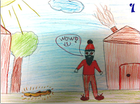 Tankus was a gnome who lived in the woods with his friends. Tankus was a journalist and wrote in the gnome paper. He looked very special, as he wore red-glassed glasses. It wasn't always easy to find something interesting to write about and the other gnomes thought he should help out with other chores.
Tankus was a gnome who lived in the woods with his friends. Tankus was a journalist and wrote in the gnome paper. He looked very special, as he wore red-glassed glasses. It wasn't always easy to find something interesting to write about and the other gnomes thought he should help out with other chores.
 One day, when Tankus was out for a walk in the woods, he gasped with surprise. Gold! Red gold! The ground was filled with red gold. He jumped up and down with joy. A worm came up from a hole in the ground, wondering what was going on. Tankus asked him about the gold, and he said there were plenty more to find down below.
One day, when Tankus was out for a walk in the woods, he gasped with surprise. Gold! Red gold! The ground was filled with red gold. He jumped up and down with joy. A worm came up from a hole in the ground, wondering what was going on. Tankus asked him about the gold, and he said there were plenty more to find down below.

Now Tankus had his story. He hurried back to his office and started writing his story. The next day the other gnomes saw a big headline:
"Gold found in the forest!"
They all came running to Tankus, with spades in their hands, asking him to show them where the gold was to be found. He promised to take them there. In the rush to get there, someone pushed Tankus so that his glasses fell off and were crushed to pieces on the ground.

Shortly thereafter they came to the spot where Tankus had seen the gold, but there were none to be seen. The gnomes started to dig. Deeper and deeper they dug into the ground. Soon there was an enormous hole in the ground, but no gold was found. The gnomes started to yell at Tankus, saying he had made fools of them. That it was all a lie. Angrily they thrust their spades into the hole and went back home.

Tankus remained where he was wondering what had happened. He was sure he had seen the gold there yesterday. Just then the worm appeared again. Tankus asked him what had happened to the gold. The worm saw his disappointment and explained that there was no gold. He asked what had happened to Tankus' glasses.
"You see", he said, "it was the red glass that made you see all that red gold. There are only grey stones here."
"What shall I do?" wondered Tankus. "The others think I'm a fool."
The worm thought for a while. Then he had an idea;

"Go to the wise owl and ask him to make a lot of red-glassed glasses. Bring the gnomes here again and hand them the glasses, and that way they will also see the gold.
Tankus went to the owl and got the glasses. Then he asked the others to come back, as he had solved the riddle. When they were gathered around the hole, Tankus explained that it was a very special gold.
 They needed to wear special glasses to see it. Then he handed out the glasses and the gnomes looked in awe at all the red gold they now could see.
They needed to wear special glasses to see it. Then he handed out the glasses and the gnomes looked in awe at all the red gold they now could see.
 And so they lived happily ever after, feeling rich with their houses filled with the red gold. Tankus continued to write his articles, and was never again asked to do other chores.
And so they lived happily ever after, feeling rich with their houses filled with the red gold. Tankus continued to write his articles, and was never again asked to do other chores.
Belga mese
A gyermek szerelem
Kata és Panna versenyeztek, hogy ki melyik srácot nyeri meg. Panna Petit nyerte meg, Kata pedig Dávidot.
Panni, amikor lefeküdt, megjelent neki egy angyal.
- Ne félj elfogadni az igaz szerelmet, mert őszinte. - mondta. Panni kérdezni akart valamit, de az angyal eltűnt.
Másnap Peti és Panna együtt játszottak. Nagyon elfáradtak és egymás nyakába borulva elaludtak. Amikor felébredtek egy furcsa csomagra lettek figyelmesek.
- Szerinted mi lehet benne? - kérdezte Panna.
- Nem tudom - hangzott a válasz. Aztán kibontották.
- Egy csodaruha! - kiáltott fel Panni.
A többiek is akartak ilyet. Panna szőtt nekik, ezzel lett egy kis pénze. Amint felvették a ruhákat tündérré változtak. Panni a tündérektől azt kérte, hogy Peti kérje meg a kezét. Így is lett.
Boldogan éltek, amíg meg nem haltak.
Zsíros Fanni, Molnár-Farkas Noel, Rácz Nikol, Csizmadia Laura 4. b
A mese eredetije:
Serena or the legend of lace
 Serena was a young lady who lived in the town of Bruges.
Serena was a young lady who lived in the town of Bruges.

Serena was madly in love with a young man, named Arnout.
 However, Serena could not marry Arnout because she had to work all day at the spinning wheel. Serena's father had died, and she had to help earn money for her mother, fours little sisters, and brother.
However, Serena could not marry Arnout because she had to work all day at the spinning wheel. Serena's father had died, and she had to help earn money for her mother, fours little sisters, and brother.
 One night the Virgin Mary appeared in one of Serena's dreams.
One night the Virgin Mary appeared in one of Serena's dreams.

Because of this dream, Serena was convinced that she had to persue her relationship with Arnout. But she was poor and he came from a wealthy family, therefore they had to keep their romance a secret.
 One day Serena and Arnout went for a walk through the streets of Bruges. They went to a park by the canals and fell asleep.
One day Serena and Arnout went for a walk through the streets of Bruges. They went to a park by the canals and fell asleep.
 When they woke up, they saw silvery threads fall from the trees into a beautiful pattern of flowers.
When they woke up, they saw silvery threads fall from the trees into a beautiful pattern of flowers.
Serena rushed home and started making lace with the same beautiful pattern of flowers she had seen in her dream.
 When the lace was finished, she sold it to a wealthy merchant for a lot of money.
When the lace was finished, she sold it to a wealthy merchant for a lot of money.
Soon Serena became famous and everyone wanted some of her lace-work.
 Serena became rich and married Arnout.
Serena became rich and married Arnout.
Finn mese 1
A barátság meséje
 Egyszer volt, hol nem volt, volt egyszer egy erdő. Itt élt Lili, Feri és Pisti, a három jó barát. Egy napon Lili a konyhában tevékenykedett.
Egyszer volt, hol nem volt, volt egyszer egy erdő. Itt élt Lili, Feri és Pisti, a három jó barát. Egy napon Lili a konyhában tevékenykedett.

Pisti és Feri az erdőszéli házukban pihentek.
A fiúk háza mellett volt egy rókalyuk. Arra repült egy holló, volt a csőrében egy jókora darab sajt.

A róka éhes volt és megérezte a sajt finom illatát. Kinézett hát a rókabámulón. Ahogy meglátta a hollót, rohant is kifelé, hogy megkaparintsa tőle a zsákmányát.

A róka így kiáltott fel:
- Most megvagy!
- de aztán leesett és balszerencséjére jól beverte a fejét.

A holló is megütötte a lábát egy faágba, amikor a rókával viaskodott. Fájdalmában felkiáltott, és a sajt kipottyant a csőréből és leesett a földre.
 Nagy erővel zuhant az ájultan fekvő róka felé, de szerencsére nem okozott bajt. A sajt csak gurult-gurult, egyenesen Lili konyhájába. A kislány kiszaladt a háza elé, hogy szóljon a barátainak:
Nagy erővel zuhant az ájultan fekvő róka felé, de szerencsére nem okozott bajt. A sajt csak gurult-gurult, egyenesen Lili konyhájába. A kislány kiszaladt a háza elé, hogy szóljon a barátainak:
- Nézzétek, mi pottyant a konyhámba!
- Egy darab sajt - szólt Pisti.
- Gyertek, készítsünk belőle uzsonnát együtt! - szólt Lili.
- Jó, megyünk - válaszoltak a fiúk.
 Eközben az ájult róka is magához tért, a holló is megpróbált a fájós lábára ráállni. Odalopóztak Lili házának ablakához, és izgatottan figyelték, mi történik odabent. A konyhában sokféle finomság készült a sajtból azon a délután.
Eközben az ájult róka is magához tért, a holló is megpróbált a fájós lábára ráállni. Odalopóztak Lili házának ablakához, és izgatottan figyelték, mi történik odabent. A konyhában sokféle finomság készült a sajtból azon a délután.
Amikor elkészültek az ennivalóval, úgy határoztak, hogy piknikezni mennek. Meghívták a kirándulásra a rókát és a hollót is. Jót uzsonnáztak közösen, utána pedig nagyot játszottak az erdőben.
Kitaláltak egy dalt és ezt énekelték:
A barátság jó, alma, körte jó a barátság.
Alma, körte jó a barátság, ha vannak barátaid,
akik, ha baj van segítenek.
Ha szomorú vagy megvígasztalnak.
A barátság és békesség a legjobb dolog a világon.
Aztán mindenki hazament. Boldogan éltek az erdőben. Itt a vége, fuss el véle.
Hegedűs Regina - 3.a
Az eredeti mese:
THE RAVEN AND CHEESE
Once upon a time there were an old man and his mistress living in a cottage in the middle of the forest. One day the mistress baked a delicious cheese. When she had taken it out from the oven, she put it on the open window because it was too hot to be eaten.
At the same time there was near the cottage a raven sitting and watching on the top of tall tree. He saw the mistress putting taht cheese on the window shelf. What a wonderful smell! Too good to be true! Just go and take it! So the raven flow and picked up the cheese.
But there was a fox sitting under the tree. He wanted to eat that cheese, too. What can he do to get it?
"You are so truly handsome. I`m sure your voice sounds wonderful - but I`ve never heard you singing. Let me hear your voice just for a while. Please!"
The raven draw itself up, but kept quiet.
"Let me hear you singing, I beg you!" the fox said.
So the raven could not keep quiet anymore.
He started to croak and so the cheese fell into the fox`s mouth.
"Thank you very much! Pity for you. Better to keep quiet next time!"
The raven was dissapointed and ashamed. He just flow away to hide himself.
Finn mese 2.
 Egyszer volt, hol nem volt, hetedhét országon is túl, ahol a kurta farkú malac túr, de még az Üveghegyen is túl, élt egy favágó család. Már régen tervezték, hogy szeretnének építeni egy saját házat. Összegyűjtötték a deszkákat és el is kezdték építeni. De hiába, nem értettek hozzá.
Egyszer volt, hol nem volt, hetedhét országon is túl, ahol a kurta farkú malac túr, de még az Üveghegyen is túl, élt egy favágó család. Már régen tervezték, hogy szeretnének építeni egy saját házat. Összegyűjtötték a deszkákat és el is kezdték építeni. De hiába, nem értettek hozzá.
 Már majdnem teljesen elkészült a ház, amikor észrevették, hogy a háznak sem ajtaja, sem ablaka nincsen. Ezért a család úgy döntött, hogy kivágják az ajtónak és az ablaknak való helyet.
Már majdnem teljesen elkészült a ház, amikor észrevették, hogy a háznak sem ajtaja, sem ablaka nincsen. Ezért a család úgy döntött, hogy kivágják az ajtónak és az ablaknak való helyet.
 Igen ám, de rosszul mérték ki a helyet az ajtónak, és nem voltak egyensúlyban a gerendák. Egyik oldalon több anyag volt, a másikon kevesebb. Addig-addig fűrészelték a falakat, hogy egyszer csak összedőlt a ház. Az egész család keservesen sírt és nagyon szomorúak voltak, hogy a munkájuk kárba veszett.
Igen ám, de rosszul mérték ki a helyet az ajtónak, és nem voltak egyensúlyban a gerendák. Egyik oldalon több anyag volt, a másikon kevesebb. Addig-addig fűrészelték a falakat, hogy egyszer csak összedőlt a ház. Az egész család keservesen sírt és nagyon szomorúak voltak, hogy a munkájuk kárba veszett.
 Mit volt mit tenniük, elmentek egy családsegítő otthonba, hogy ott éljenek. Anyuka nagyon sírt, elkeseredett. Apuka csak fel-alá sétált és a gyerekek is szomorúan töprengtek, vajon mit ronthattak el. Tanakodtak, gondolkodtak, arra jutottak, hogy legközelebb nem felejtik el, hogy az ablakot és az ajtót is rá kell tervezni a házra. Nagyon rosszul érezték magunkat a családok átmeneti otthonában, így mindenképpen szerettek volna egy saját házat.
Mit volt mit tenniük, elmentek egy családsegítő otthonba, hogy ott éljenek. Anyuka nagyon sírt, elkeseredett. Apuka csak fel-alá sétált és a gyerekek is szomorúan töprengtek, vajon mit ronthattak el. Tanakodtak, gondolkodtak, arra jutottak, hogy legközelebb nem felejtik el, hogy az ablakot és az ajtót is rá kell tervezni a házra. Nagyon rosszul érezték magunkat a családok átmeneti otthonában, így mindenképpen szerettek volna egy saját házat.
Napról napra egyre több gerendát gyűjtöttek, és egy esztendő múlva úgy döntöttek, hogy újrakezdik építeni a kis faházat. Először átgondolták és megtervezték a házépítés lépéseit. Az első volt az alapozás, majd a gerendákat rakosgatták egymás után. Nagyon keményen dolgoztak és mindennap alaposan el is fáradtak. De ezúttal nem felejtették el, hogy az ablakoknak és az ajtónak a helyét elővigyázatosan át kell gondolni, hová is tegyék. Lemérték az ajtó és az ablakok szélességeit, hosszúságait és a gerendákat is ennek megfelelően darabolták széjjel. Egymás után sorba, rendbe tették helyükre a gerendákat.
 A ház néhány hónap alatt el is készült. Nagyon boldogok voltak, nagy hálát adtak a Jóistennek, hogy ezúttal ügyesen fel tudták építeni a faházat. Nagyon kimerültek, de megérte a sok fáradságot, mert hosszú idő elteltével most már a saját házukban hajthatják álomra a fejüket. Elhatározták, hogy mindenkinek el fogják mesélni, hogyan is kell házat építeni, hogy mások ne essenek ugyanabba a hibába, mint ők.
A ház néhány hónap alatt el is készült. Nagyon boldogok voltak, nagy hálát adtak a Jóistennek, hogy ezúttal ügyesen fel tudták építeni a faházat. Nagyon kimerültek, de megérte a sok fáradságot, mert hosszú idő elteltével most már a saját házukban hajthatják álomra a fejüket. Elhatározták, hogy mindenkinek el fogják mesélni, hogyan is kell házat építeni, hogy mások ne essenek ugyanabba a hibába, mint ők.
Azóta is boldogan élnek, míg meg nem halnak.
Így volt, vége volt, mese volt.
2. a osztály
A mese eredetije:
LIGHT INTO THE HOUSE
(Hölmölä means the place where silly people lives.)
The house of Hölmölä was too dark. Since no one wanted to be in the dark, they had to get the light into the house. But how? They discussed and pondered very hard. Finally someone came up with the idea, that the world is full of light and they have bags to carry the light into the house. Men grapped some light in their bags and carried it into the house. At the same time women brought the darkness out with their bags. They thought that this is the way they will get the house much brighter.
Matti, the neighbour, came to Hölmölä while they were carrying the light in and darkness out. Someone told him what they were doing. Matti made a proposal to them how to make the house brighter. He took an ax, went to the house and cut a small hole in the wall, a window. Hölmölä people went into the house and they saw how much liht came through the window. So simple but good idea!
After Matti went back home they decided to expand the window. They made it larger and larger and finally there wasn`t any wall left. The house was really bright, but they wanted more light. They decided to make another window and in a little while another wall was gone.
Still they would have wanted more light, but while they were cutting the third wall, the whole house collapsed. Hölmölä people was little sad because of their house. But after all it didin`t matter because now there was plenty of light.
Lengyel mese
A sárkány és a király
 Egyszer volt, hol nem volt, az Óperenciás tengeren is túl, még a kurta farkú malacon is túl, volt egy hatalmas hegy.
Egyszer volt, hol nem volt, az Óperenciás tengeren is túl, még a kurta farkú malacon is túl, volt egy hatalmas hegy.
Ennek a hegynek a tetején egy csodálatos palota állt. Lakója egy öreg király volt. Egyedül élt a palotában, még udvarosa sem volt.

A hegy mélyében egy barlang húzódott, amelyben magányos sárkány lakott. Nemcsak magányos volt, hanem vad is. Nem volt barátja sem. Senki sem látogatta meg sosem. A szájából mindig tüzet okádott. Az emberek is és az állatok is féltek tőle.
Egy nap a király így morfondírozott magában:
- Meg kellene szelídíteni ezt a sárkányt! Hátha még barátok is lehetnénk!

Paraszti ruhát öltött és báránnyal a kezében meglátogatta a sárkányt. A bárány szelídsége megtetszett a sárkánynak. Attól a naptól kezdve soha többé nem hányt tüzet. S nemcsak a király, de a közeli falubeliek is mindig meglátogatták. A királlyal olyan jó barátságot kötött, hogy felköltözött a palotába.
Aki nem hiszi, járjon utána.
Kovács Daniella és Hegedűs Maja - 3.b osztály
Az eredeti lengyel mese angolul:
HE LEGEND OF THE WAWEL DRAGON
In a cave at the bottom of Wawel Hill there once lived a terrible fire-belching dragon. This dragon roamed around the countryside and did whatever he wanted to. He ate sheep and cattle and scared the farmers so much that they didn't let their animals graze in the field near the Vistula River. Many brave knights had tried to kill the monster, but before they could get close enough to him, he blew fire on them and they were burned to death.
The king wanted this dragon destroyed. He invited knights and noblemen to come and slay the dragon, promising that whichever one killed the dragon could marry his beautiful daughter and become king when he died. Many tried to slay the dragon so that they could marry the princess, but the dragon killed them. The people became even more frightened; they were afraid to leave their homes and the country became poorer.
One day, a young, handsome but poor shoemaker's apprentice named Krak asked the king if he could try to slay the dragon. The king said he could try, but noted that he had no armor, no horse and no sword. The apprentice had only his shoemaker tools and a plan. He didn't need armor, a horse, or a sword.
Krak bought a dead sheep from the butcher and some sulphur (a powder that is used in making matches) from a miner. Then he cut the sheep open with his sharp shoemaker's knife, stuffed it with the powdered sulphur and then sewed the sheep up with the shoemaker's thread. He put the sheep by the dragon's cave and waited behind a rock for the dragon to come out. After a while, the greedy dragon came out from his cave. He saw the dead animal and greedily ate it. The sulphur caught fire,
like a match, and the dragon felt his stomach burning. He ran to the river to quench the fire in his stomach, but drank so much water that he filled up like a balloon. He kneeled down and was very sick.
Krak came out from behind the rock, and began to throw stones at the dragon. The monster tried to blow fire at him but because of all the water he drank, all that came out from his mouth was steam. The dragon kept trying to breathe fire, but because he was so swollen, he exploded and died. At last the people were free of him.
Krak and the princess married. After her father, the King, died, Krak became King, as promised. He built a castle on top of Wawel Hill and for hundreds of years it was where the Kings of Poland lived. Around the hill, the people built a city which they named Krakow, after their new king.
Török mesék - A verzió
Mandi és a szerencse
Egyszer egy mandarin a fánkkal és a naranccsal elment fürödni. Azt játszották, hogy ki tudja a víz alá elsőnek lenyomni a fánkot. Mikor elfáradtak, azt mondta a mandarin:
- Figyeljetek, srácok! Már mindenki elfáradt, ideje lenne, hogy hazamenjünk!
- Igaza van a mandinak - mondta a fánk.
- Menjünk haza! - mondta a mandarin.
- De miért? - kérdezte a narancs.
Elindultak. Mikor ment hazafelé a mandarin, látott egy nyuszit.
- Eljönnél velem az otthonomba? - kérdezte a mandarin.
- Persze - válaszolta a nyúl.
Elindultak. Mentek, mendegéltek, egyszer csak arra döbbentek rá, hogy elkezdett esni a hó. Megálltak játszani, de gyorsan tova is mentek. Mikor elkezdett sötétedni, találkoztak egy kalitkába zárt madárral. Fölmászott a mandarin a fára és kiengedte a csodaszép madarat. Éjszaka lett, s a mandarin elaludt a fán. Reggel nagyon fájlalta a hátát. Kinyújtózott és továbbment. Talált egy kukoricát. Látott két tevén jövő embert és megkérte őket, hogy vigyék elő őt a nagypapájához. Az emberek elvitték . Mandi a papája nyakába ugrott és boldogan éltek, míg meg nem haltak.
Horváth Bíborka 4.a
Jóska kalandjai
Egyszer Jóska a barátaival fürdött a tóban. Amikor kifürödték magukat, Jóska elindult haza. Útközben meglátott egy nyulat a bokorban. Odacsalogatta a nyulat magához, felvette és ment tovább. Megint megpillantott egy zsákot, azt már nem vette föl. Ment tovább. Meg kellett állnia, mert egy nagy fa az útjába került. Amint meg akarta kerülni a fát, keserves madárcsicsergést hallott. Felnézett és látta, hogy egy madár van fölakasztva a fa ágára, kalitkába zárva. Hát felmászott a fára és kiszabadította a kalitkába zárt madarat. A madár meg vígan elrepült. Megint ment tovább. Egyszer csak megszólítja valaki:
- Hé kisfiú, tudtad, hogy az a nyúl a szultáné? Elveszett a nyula is, azt mondta, hogy aki megtalálja annak két zacskó aranyat ad. Te találtad meg, hát tied a jutalom.
Elvezette a szultánhoz, megkapta a jutalmat, és boldogan ment haza.
Gabnai Alexandra 4.a
Jancsi utazása
Jancsi, Marcsi és Laci boldogan lubickoltak a medencében. Nagyon jól érezték magukat. Jancsi másnap elment kirándulni a közeli erdőbe. Ment, mendegélt és meglátott a bokorban egy nyuszit és felkiáltott:
- Ja, de aranyos ez a nyulacska!
Fogta és magával vitte. Ment tovább és meglátott egy pénzzel teli szütyőt, de nem vitte magával, mert a bagoly rossz szemmel nézett rá és azt gondolta, hogy biztosan ő őrzi. Amint továbbment, valami zajt hallott és fölnézett. Egy kalitkában egy madarat látott.
- Szegényke! - mondta. - Bárcsak tudnék rajta segíteni!
Fölmászott a fára és kiengedte. A madár boldogan elrepült. Lemászott és egy bokros részhez ért. Ott két lovas emberrel találkozott. Fölnézett az égre és megpillantott egy katicát.
- Bárcsak el tudnálak érni!
Tűnődött egy darabig, de mire eszébe jutott egy épkézláb ötlet, addigra a katicának se híre se hamva nem volt. Bánatosan ment tovább. Bement a szultánhoz és ezt mondta neki:
- Felséges uralkodóm! Messziről jövök és útközben találtam egy nyulat. Elhoztam Önnek. Fogadja el ajándékba!
- Köszönöm, fiam. Nagyon aranyos ez a nyulacska. Ő lesz az én legkedvesebb háziállatom.
Jancsi boldogan indult haza.
Veres Zsófi 4.a
A török mese eredetije angolul:
THE SULTAN OF TREASURES
 Once upon a time, there were many who were speaking less, but obeying advice. As the sun was going down,and the cats were sleeping quietly, there was a tale being told.
Once upon a time, there were many who were speaking less, but obeying advice. As the sun was going down,and the cats were sleeping quietly, there was a tale being told.
In one of the countries, Keloğlan, whose head was bald from the day he was born, lived with his dear mother. Keloğlan's mother was too old to work and also Keloğlan was too young to work.If he worked one day,he chose to play for ten days.His mother pitied her dear son,and thougt that he would play and have fun as much as he could.But whenever they had no money, she had to want her son to work in order to gain some money for living.
Keloğlan sometimes went to the forest,and loaded wood to his donkey and sold them in the bazaar or sometimes he became a shepherd to the sheep of peasants in order to gain money. One day,his mother sent Keloğlan to work,but on that day Keloğlan wanted neither to sell wood nor become a shepherd.As he was thinking what he should do,there came an idea.He thought that he would go to the forest and hunt a rabbit,and when he returned home with that rabbit,they would cook and eat it for two days.
One day,his mother sent Keloğlan to work,but on that day Keloğlan wanted neither to sell wood nor become a shepherd.As he was thinking what he should do,there came an idea.He thought that he would go to the forest and hunt a rabbit,and when he returned home with that rabbit,they would cook and eat it for two days.
He set a trap and hid himself behind a bush.After a while, he saw a rabbit coming near the trap. He got happy about this,but there was something strange with that rabbit.It wasn't coming to the trap just like a normal rabbit hopping and jumping,but walking slowly and slowly. Keloğlan couldn't stand and he raised his head from the bush. He looked carefully at the rabbit but what did he see? The rabbit was wounded,writhing in pain.Keloğlan felt pity for the rabbit, hugged it and understood that the rabbit's heart was thumping and it was looking at him as if begging for mercy.
Keloğlan couldn't stand and he raised his head from the bush. He looked carefully at the rabbit but what did he see? The rabbit was wounded,writhing in pain.Keloğlan felt pity for the rabbit, hugged it and understood that the rabbit's heart was thumping and it was looking at him as if begging for mercy.
Keloğlan decided to take the rabbit home and cure it.While he was walking home with the rabbit,what did he find?A purse with full of gold.
He got surprised,but he thought:
"-Whoever had it lost must be very upset about it. So I can't take the purse with me. The best thing to do is to hide it somewhere here. So, its real owner can easily find it."
And he continued his way. While Keloğlan was walking by stroking the wounded rabbit, there came to be a huge tree on Keloğlan's way.He watched the tree surprisingly as he hadn't seen it before. But what did he see on the tree? A phoenix in a cage whose feathers were shiny and colourful.The cage was being hung among the tree's branches.
While Keloğlan was walking by stroking the wounded rabbit, there came to be a huge tree on Keloğlan's way.He watched the tree surprisingly as he hadn't seen it before. But what did he see on the tree? A phoenix in a cage whose feathers were shiny and colourful.The cage was being hung among the tree's branches.
Keloğlan got very surprised to this.He wondered who did this evil thing to this beautiful bird.He told the wounded rabbit not to move as he was helping this beautiful bird.
But the tree was so huge that Keloğlan could climb it with difficulty.When he came near to the bird,he realised that it was much more beautiful than it seemed.Keloğlan let the bird free. Keloğlan climbed down,took the wounded rabbit and continued his way.He thought:
Keloğlan climbed down,took the wounded rabbit and continued his way.He thought:
"-How many strange things did I face today?I couldn't understand anything. I should go home and tell all these to my dear mother. Let's see what she will say."
While he was coming to the end of the forest,two guardians stopped Keloğlan.He got puzzled and asked what they wanted from him.
The guardians said :
"- You must come to the palace with us. Let's horse and follow us."
Keloğlan strached his bald head,and looked at both the rabbit and the guardians. He said:
"-Gentlemen,I think you have mistook me for someone else. I have no relationship with the palace, so let me go and cure the rabbit's wounds."
The guardians refused this,and added:
"-You must come with us,you are the man we are looking for." Keloğlan didn't understand anything,and strached his bald head again. He horsed and followed them.They started going to the palace.
Keloğlan didn't understand anything,and strached his bald head again. He horsed and followed them.They started going to the palace.
At the end,they arrived at the palace.The guardians took Keloğlan in front of the throne,and told him to wait.After a while there came a man with white beard and beautiful face.He said :
" - You are the brave to become the sultans of the treasures."
Keloğlan got puzzled again and said:
"-You are doing something wrong,neither I know the treasures nor the sultan.The guardians mistook me for someone else."
The man with white beard began talking:
"- They call me the Sultan of Goodness. One day, our sultan asked me to come to his presence. He was looking for someone who was honest,kind and brave.But he didn't know who to choose.He ordered me to find the brave man.And I accepted the order,and placed the wounded rabbit,the purse and the phoenix.There were many who found the rabbit,the purse and the phoenix,and nobody behaved in a way you did.But you pitied the rabbit,didn't take the purse,and let the bird free.You are a fair boy.We are looking for the sultan of treasure and it is you.So what will you say?Will you accept it?" Keloğlan understood what had happened.He strached his bald head again and didn't know what to say.
Keloğlan understood what had happened.He strached his bald head again and didn't know what to say.
At the end,he said:
"- If this is an order from our sultan,I will accept this with pleasure."
He took his mother near him to the palace,and became the sultan of the treasure.Since this time,he had always been a man of honesty,justice and truth.
There fell three apples from the sky,one was for Keloğlan,the other was for the sultan of the goodness,and the last one was for the reader of this tale :))
Olasz mese:
A jóságos királylány
 Mesénk az Óperenciás-tengeren egy kicsit túl kezdődik. Itt áll egy csodálatos ka
Mesénk az Óperenciás-tengeren egy kicsit túl kezdődik. Itt áll egy csodálatos ka






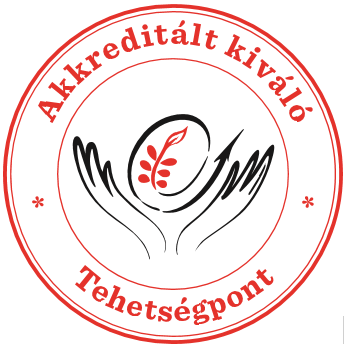





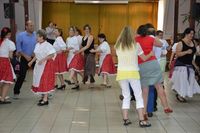
 Layer8
Layer8